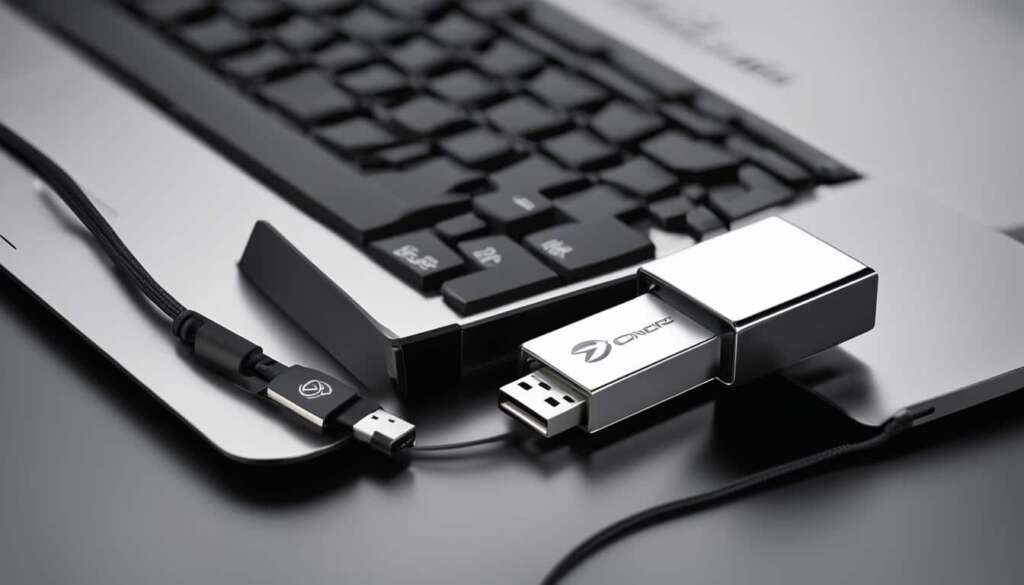Table of Contents
USB flash drives have become a ubiquitous part of modern life. These small, portable devices offer a convenient and reliable way to store and transfer data. With their increasing popularity, it’s essential to understand the uses and benefits of USB flash drives.
A USB flash drive is a portable storage device capable of holding data in electronic format. Invented in 1999, its popularity has grown since its inception as it provides a more convenient and reliable form of data storage and transfer than optical disks such as CDs and DVDs.
USB flash drives offer a number of benefits making them a favored option for data storage and transfer. They are lightweight and portable while providing large amounts of data storage. They are compatible with most devices, making it easy to transfer data from one device to another. USB flash drives also offer a reliable backup solution for important data by allowing users to keep copies of their important files.
Whether you are a student, entrepreneur or working professional, understanding USB flash drives and their benefits is vital. This guide provides an overview of USB flash drives, their benefits and how to use them effectively.
Key Takeaways
- USB flash drives are a portable, easy-to-use data storage and transfer solution.
- They offer large amounts of storage space and are compatible with most devices.
- USB flash drives provide a reliable backup solution for data storage.
- They are an essential tool for students, entrepreneurs, and professionals.
- A USB flash drive is better than optical disks such as CDs and DVDs as it provides a more convenient and reliable form of data storage and transfer.
What is a USB Flash Drive?
A USB flash drive is a small, portable storage device used for storing and transferring files between different devices. They typically range in size from a few gigabytes to upwards of one terabyte, and are available in various shapes and colours.
USB flash drives are also commonly referred to as thumb drives, pen drives, or jump drives, and offer a number of benefits over other forms of data storage, such as floppy disks and CDs. They are easy to use and can be connected to a wide range of devices, including laptops, desktop computers, and smartphones, making them a popular choice for those who need to transfer files between different devices frequently.
Despite their small size, USB flash drives are capable of holding large amounts of data, making them an ideal choice for storing documents, photos, and other important files. They can also be used for backing up important data, providing an additional layer of security in case of a system failure.
Physical Appearance
USB flash drives are typically small enough to fit in the palm of your hand, with dimensions ranging from 2 to 3 inches in length, and half an inch to an inch in width. They are typically made of plastic or metal and often have a removable cap to protect the connector. Some models also include a keyring or lanyard attachment for convenience and portability.
Storage Capacity
The storage capacity of USB flash drives has increased drastically over the years. Initially, they were only capable of storing a few megabytes of data, but now, it is possible to find drives with capacities of several terabytes, depending on your storage needs.
The size of the data being stored will determine the capacity of the flash drive required. For instance, a high definition video will need more storage space compared to a word document or a small PDF file.
Easy Connectivity
One of the most significant benefits of using a USB flash drive is the ease with which it can be connected to different devices. They use standard USB interfaces, which means that they can be plugged into any device that has a USB port, such as a laptop, desktop computer, or tablet.
Another advantage of USB flash drives is that they are generally plug-and-play, meaning that they don’t require any additional software or drivers to run. You simply plug them into your device, and they’re ready to use.
“USB flash drives offer a convenient and reliable way to store and transfer data, making them an indispensable tool for individuals and businesses alike.”
Overall, USB flash drives have become a popular choice for data storage and transfer due to their convenience, portability, and ease of use.
Benefits of USB Flash Drives
USB flash drives have several advantages over other forms of data storage. In this section, we will explore some of the benefits of using USB flash drives.
Compact Size
One of the most significant benefits of USB flash drives is their compact size. They are small enough to be carried in a pocket or on a keyring, making them a convenient choice for people who are always on the go. Their size also means they take up minimal space on a desk or in a bag.
Portability
USB flash drives are highly portable and can be used on the go. They can be plugged into a laptop, desktop computer or any other device with a USB port. Unlike external hard drives, USB flash drives do not require an external power supply, which makes them an ideal solution for people who need to transfer data between devices on the go.
Compatibility
USB flash drives are compatible with most devices with a USB port, regardless of the operating system. Whether you use a Windows PC, Macbook or Linux machine, you can use a USB flash drive to transfer data between them. This flexibility makes USB flash drives a versatile data storage and transfer solution.
Durability
Most USB flash drives today are designed to be robust and durable. They can withstand drops and shocks and are much less likely to suffer damage than traditional hard drives. This makes USB flash drives ideal for people who travel frequently and need to carry their data with them.
Overall, USB flash drives offer users a convenient, reliable and portable data storage and transfer solution with several benefits over other forms of data storage. Whether you need to share data between devices or just want to keep your data safe and secure, a USB flash drive is an excellent choice.
Conclusion
In summary, it is clear that USB flash drives have become an essential tool in today’s world, providing a reliable and convenient solution for portable data storage and transfer. From individuals to large businesses, the benefits of USB flash drives are impossible to ignore. The compact size and compatibility with most devices make them an ideal option for transferring files, backing up important data, or simply carrying documents with you on the go.
As technology continues to advance, USB flash drives will undoubtedly continue to play a significant role in data storage and transfer. With the ability to hold increasing amounts of data and the inclusion of security features to protect sensitive information, USB flash drives are an indispensable tool that will remain relevant for years to come.
In conclusion, whether you are a student, professional, or simply someone who wants to keep their data safe and portable, a USB flash drive is definitely a worthwhile investment that will make your life easier.
FAQ
What is a USB flash drive?
A USB flash drive is a portable device used to store and transfer data. It is a small, removable storage device that connects to computers and other compatible electronic devices via a USB port.
How does a USB flash drive work?
USB flash drives work by using flash memory technology. They contain a memory chip that stores data electronically instead of using mechanical parts like traditional hard drives. When plugged into a USB port, the device is recognized by the computer or device, allowing files to be read from or written to the flash drive.
What are the benefits of using USB flash drives?
USB flash drives offer several benefits. They are compact, lightweight, and highly portable, making them convenient for carrying data wherever you go. They have large storage capacities, allowing users to store and transfer large files easily. USB flash drives are also compatible with most devices and operating systems, making them versatile and widely accessible.
Can USB flash drives be used for backing up files?
Yes, USB flash drives are an excellent option for backing up important files. By storing copies of your files on a USB flash drive, you can protect them in case of computer failure or data loss. Simply copy and paste or drag and drop your files onto the flash drive to create a backup.
How do I transfer files to a USB flash drive?
To transfer files to a USB flash drive, first, insert the flash drive into an available USB port on your computer. Wait for the computer to recognize the flash drive. Then, open the file explorer or file manager on your computer. Locate the files you want to transfer and either copy and paste or drag and drop them onto the USB flash drive icon or folder. Once the transfer is complete, safely eject the flash drive before unplugging it from the computer.












